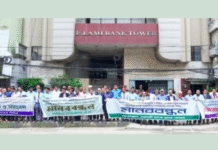In order to support Bangladesh’s swift response and to assist those who have been affected by the worst flooding, the UN’s Central Emergency Response Fund (CERF) has allocated US$2.4 million to support the humanitarian response.
To date, more than 720,000 houses have been damaged or destroyed, and 172 shelters in flood-affected areas are sheltering more than 46,000 people.
Agricultural land and vital infrastructure such as schools, health facilities, roads and bridges have been damaged.
Following heavy monsoon rains, one-third of Bangladesh has been affected by the worst flooding in four decades, impacting eight million people across 32 of the country’s 64 districts.
Those people who have lost their homes, livelihoods and means of making a living are in need of immediate life-saving assistance.
UN agencies and NGOs are already assisting the government of Bangladesh to respond to the needs of flood-affected people in northern and central parts of Bangladesh.
The CERF funding will allow agencies to scale up their responses and reach 100,000 people who have been most acutely affected by the flooding in the two most severely affected districts, Dinajpur and Jamalpur.
The funding will be used to provide water and sanitation facilities, food assistance through cash transfers, health support for pregnant women and newborn babies, and emergency shelter kits.
The UN resident coordinator for Bangladesh, Robert Watkins, said “Bangladesh is used to flooding at this time of the year during the monsoon, but the volume of water that has fallen this year has been exceptionally heavy. There is a limit to people’s resilience, and that has already been severely tested”.
To complement the response led by the government of Bangladesh, the humanitarian community has developed a six-month response plan, which the CERF allocation will contribute to in terms of funding.
The response plan requests US$12 million to support 330,000 flood affected people in six of the worst affected districts – Gaibhandha, Dinajpur, Kurigram, Jamalpur, Nilphamari and Sirajganj.
This is the fourth time that Bangladesh has experienced flooding this year and the latest floods have coincided with the rice planting season, with likely implications for longer-term food security and livelihoods.
Consequently, the response plan outlines the planned life-saving and protection assistance activities of UN agencies and NGOs, as well as the early recovery actions required to restore access to basic services and rehabilitate community infrastructure.
Source: Prothom Alo









